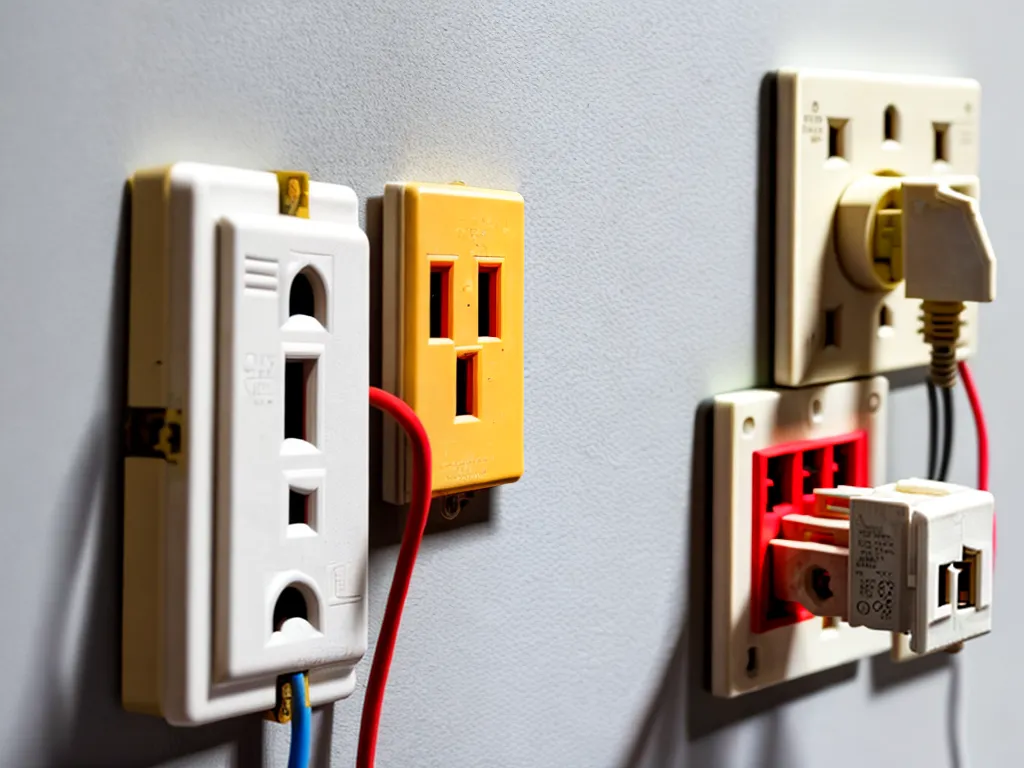
Installing electrical outlets and switches may seem intimidating, but with the right materials and safety precautions, even beginners can learn the basics of residential wiring. This guide will walk you step-by-step through the process of wiring switches and outlets in your home.
Understanding Electrical Basics
Before I start any electrical project, it's crucial that I understand some electrical fundamentals to work safely and ensure proper functionality. Here are some of the basic concepts I research:
- Voltage - The pressure or force of electricity. In the US, standard voltage for outlets is 120 volts.
- Current - The flow of electricity measured in amps. Most residential circuits are 15 or 20 amps.
- Circuits - Closed loops that electricity can flow through. Residential electrical systems have multiple circuits branching off the main service panel.
- Grounding - Providing a safe path for electricity to flow to the ground in the event of a fault, which protects from electric shock.
- Wiring gauge - The diameter of the conductive metal wires. Common gauges are 14 gauge and 12 gauge.
Gathering the Right Supplies
I make sure to have the following supplies on hand before beginning any electrical wiring project:
- Electrical tape - Used to insulate wire connections
- Wire strippers - Removes plastic insulation from wires
- Voltage tester - Verifies power is off to wires before working
- ** screwdrivers** - For installing switches and outlets
- Junction boxes - Plastic boxes used to host wiring connections
- Cable clamps - Secures cables entering metal boxes
- Electrical cables - 14/2 or 12/2 NM cables are commonly used
Safety comes first, so I wear protective gear like eyeglasses, gloves, and long sleeves. I also turn off the main power at the circuit breaker before working.
Switch Wiring Basics
Here are the steps I follow to wire a basic single-pole light switch:
- I choose the location for the light switch and install a junction box if necessary. Ideally 46-48 inches above the floor.
- I run NM electrical cable from the switch box to the ceiling light electrical box.
- At the switch box, I connect the black (hot) wire to one screw terminal on the switch and the white (neutral) wire to the other screw terminal.
- I connect the ground wire to the green screw or attach it to the grounded metal box.
- At the ceiling box, I connect the black wire from the switch to the black wire going to the light fixture. The white wires are wire nutted together.
- I connect the ground wires to the light fixture and ceiling box.
This basic setup allows the switch to control the power flow to the light. Always follow diagrams and local codes.
Outlet Wiring Basics
Here are the main steps involved in wiring a new 120 volt electrical outlet:
- I choose the outlet location and install a junction box if needed. Make sure to position 12-15 inches above floor level.
- I run NM electrical wiring cable from the outlet box back to the circuit breaker panel, or the nearest outlet in the circuit.
- At the outlet box, I connect the hot (black) wire to the hot brass screw, the neutral (white) wire to the silver screw, and the ground wire to the green screw.
- I connect the wires to the outlet similarly - black to brass, white to silver, ground to green.
- If there are multiple outlets in a circuit, I pigtail the outlets and wire them in a daisy chain configuration.
Always take precautions like turning off the power, verify with a voltage tester, and follow local building codes.
Handling Common Complexities
I run into some wiring intricacies on more complex jobs:
- 3-way switch circuits - Allow control of a light from 2 switch locations. Requires an extra conductor between the switches.
- GFCI outlets - Shut off power rapidly if an abnormal current is detected to prevent shock. Often used where water is present.
- 220 volt circuits - Used for large appliances like dryers which require double the voltage of standard outlets.
- Aluminum wiring - Presents safety issues due to expansion and contraction. Pigtailing with copper wiring is recommended.
If I run into any of these scenarios, I research thoroughly and consult local codes before attempting the wiring. Safety is paramount when handling complex electrical work.
Helpful Safety Tips
I keep these safety best practices in mind for all electrical projects:
- Turn off the circuit breaker to verify power is OFF before working.
- Wear protective gear like glasses and gloves, especially when handling breaker panels.
- Double check connections are tight and insulated properly before turning power back on.
- Connect ground wires first and disconnect them last to avoid shocks.
- Label all wires and make a circuit map to avoid confusion.
- Never work alone - have someone present in case of emergency.
- Ask for help from an electrician if you feel unsure about tackling a project solo.
Taking precautions helps ensure I don't get injured or damage the electrical system. Safety is key with DIY electrical work.
Final Thoughts
With the right safety gear, tools, and fundamentals, wiring basic switches and outlets is totally doable for beginners. But significant electrical issues or complicated circuits should always be handled by licensed electricians. Start with simple projects and work up to more complex wiring as your skill level progresses. And never hesitate to call in a professional if you need help. With practice, residential electrical work can become more manageable. Just remember to always put safety first!